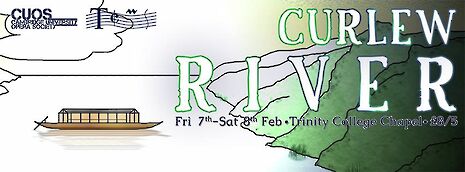Opera: Curlew River
Thea Hawlin enjoys an evening with Benjamin Britten in Trinity Chapel

It would be hard to argue that Benjamin Britten’s self-proclaimed ‘church-parable’ could wish for a better setting than the wonder that is Trinity College chapel. From the moment the cast enter in procession from the back the entire building fills with sound, the echo of the walls extending and enlarging each singer’s voice as they both pay homage to the traditional ‘church’ songs and, with Britten’s guidance, sing a song truly of their own.
This is a tale of a bittersweet reunion, of collision and abrupt separation, of the young and the old. A mother’s lament and search for a lost child, a parable that transcends time, where James Robinson’s Madwoman escapes the confines of the rigid ‘Noh’ structure of the theatre in order to beg an audience to find her child. The Madwoman’s isolation is exacerbated through a physical isolation, in which Robinson is able to crumple, to moan, to wander aimlessly about the stage, while the rest of the cast remain in strict formation throughout.
However, despite the evident strength of all the individual singers, demonstrated particularly in the extended solos of Michael Mofidian’s majestic Ferryman, Robinson’s Madwoman and Robbie Haylett’s Traveller, the real power of this production arises when these voices come together. The incredible technical abilities of each singer combine to establish an overwhelming soundscape in which every voice moves seamlessly in and out, breaking off into parts and reassembling with ease. This performance is above all an ensemble piece. The cast move beautifully as one, they become the very scene they set, moving in to form the sail of a boat, retreating to exacerbate a woman’s isolation, they lift arms to the air and hold hands to hearts in perfect synchrony, voices and bodies working together to create a unison that lifts the music. In one scene, this ‘lift’ is literal as Mofidian appears to transport us on his ferry, the music responding to his very touch. The motifs of movement established throughout, although highly stylised, are recognised as such, making movements that could easily be rendered dull and monotonous but which are instead striking and ultimately deeply moving.
In the final scenes, Bethany Partidge’s dazzling interlude is swallowed into the chapel, cunningly hidden out of sight in the wings, a true ghostly presence. This momentary confusion leaves us just as perplexed as Robinson himself. The voice is elusive, eerie; the contrast of Partidge’s voice with the otherwise all-male cast adding further distance between mother and child, living and dead, as the great swell of voices becomes punctured by a voice that is simultaneously as quiet and as loud as it gets. This conflicting absence and presence causes Robinson to stumble around the stage as if following the voice, collapsing limbs in a contorted dance, desperate and endearing, in which a mother tries to reconnect with a lost child. The moment haunts long after leaving the chapel, as does the music. A simple tale, beautifully executed.
 News / Colleges charge different rents for the same Castle Street accommodation2 March 2026
News / Colleges charge different rents for the same Castle Street accommodation2 March 2026 News / King’s hosts open iftar for Ramadan3 March 2026
News / King’s hosts open iftar for Ramadan3 March 2026 Theatre / Lunatics and leisure centres 4 March 2026
Theatre / Lunatics and leisure centres 4 March 2026 News / Angela Merkel among Cambridge honorary degree nominees27 February 2026
News / Angela Merkel among Cambridge honorary degree nominees27 February 2026 News / News in Brief: waterworks, wine woes, and workplace wins 1 March 2026
News / News in Brief: waterworks, wine woes, and workplace wins 1 March 2026







